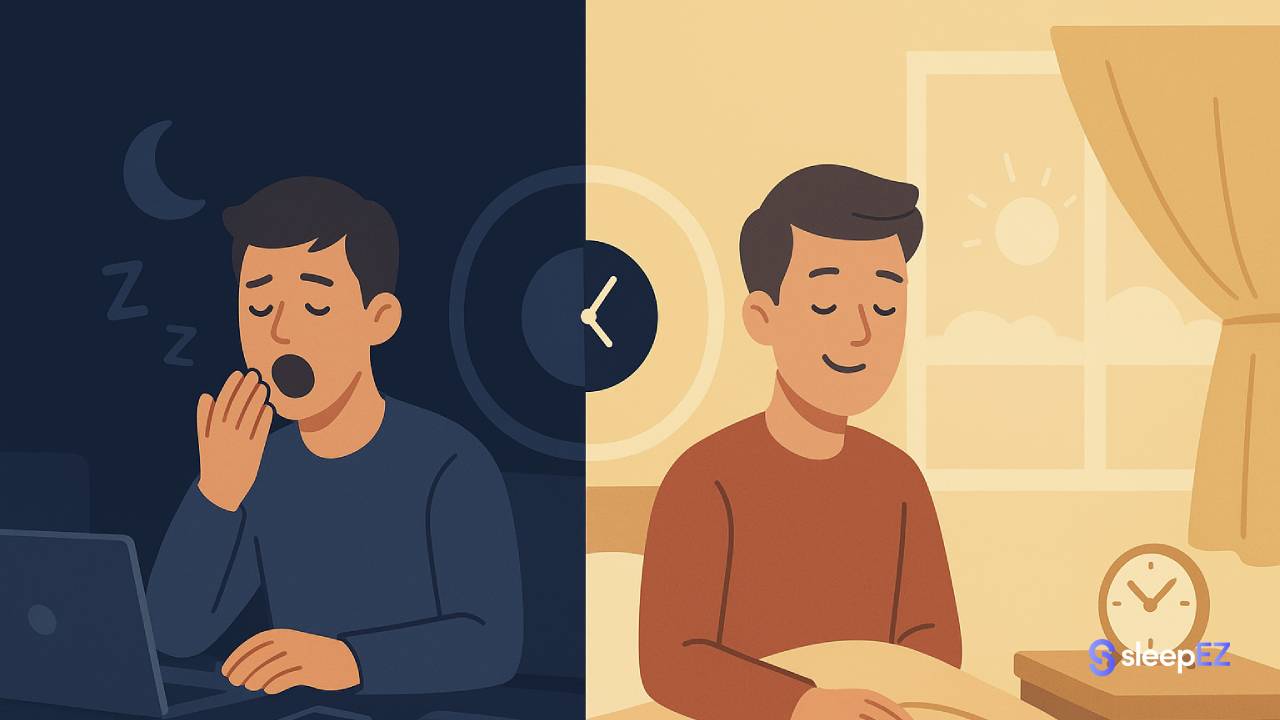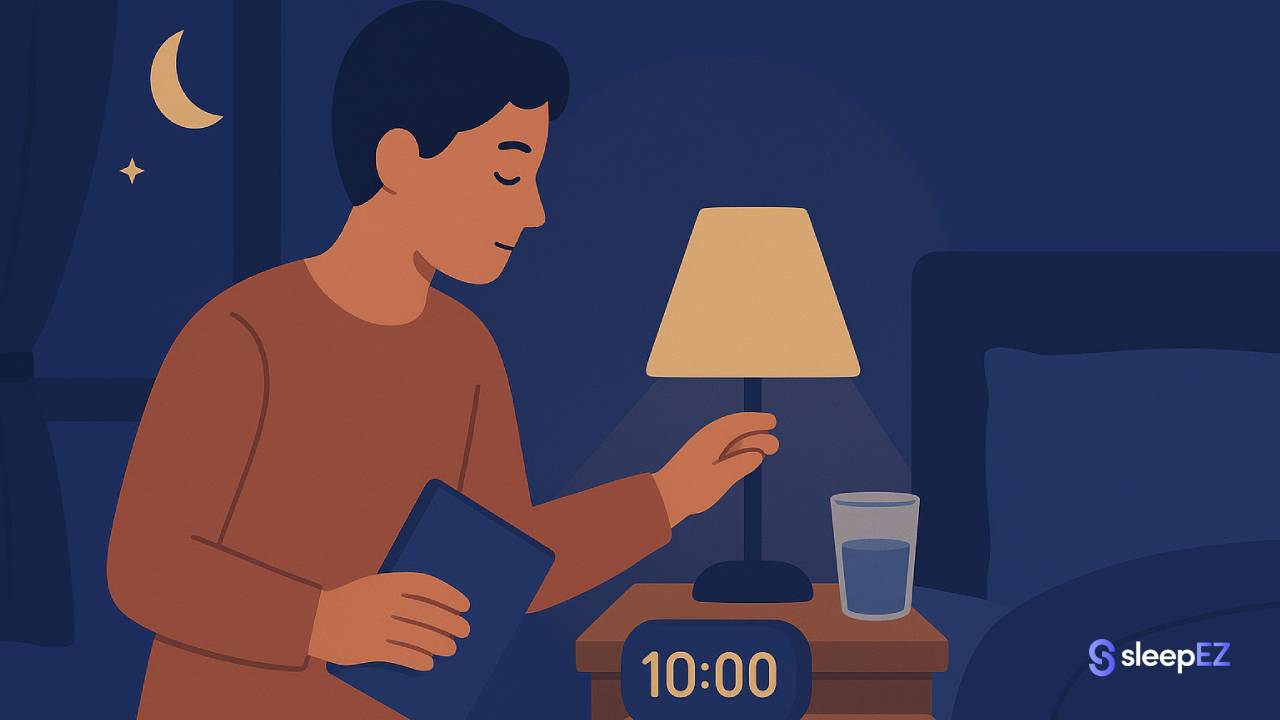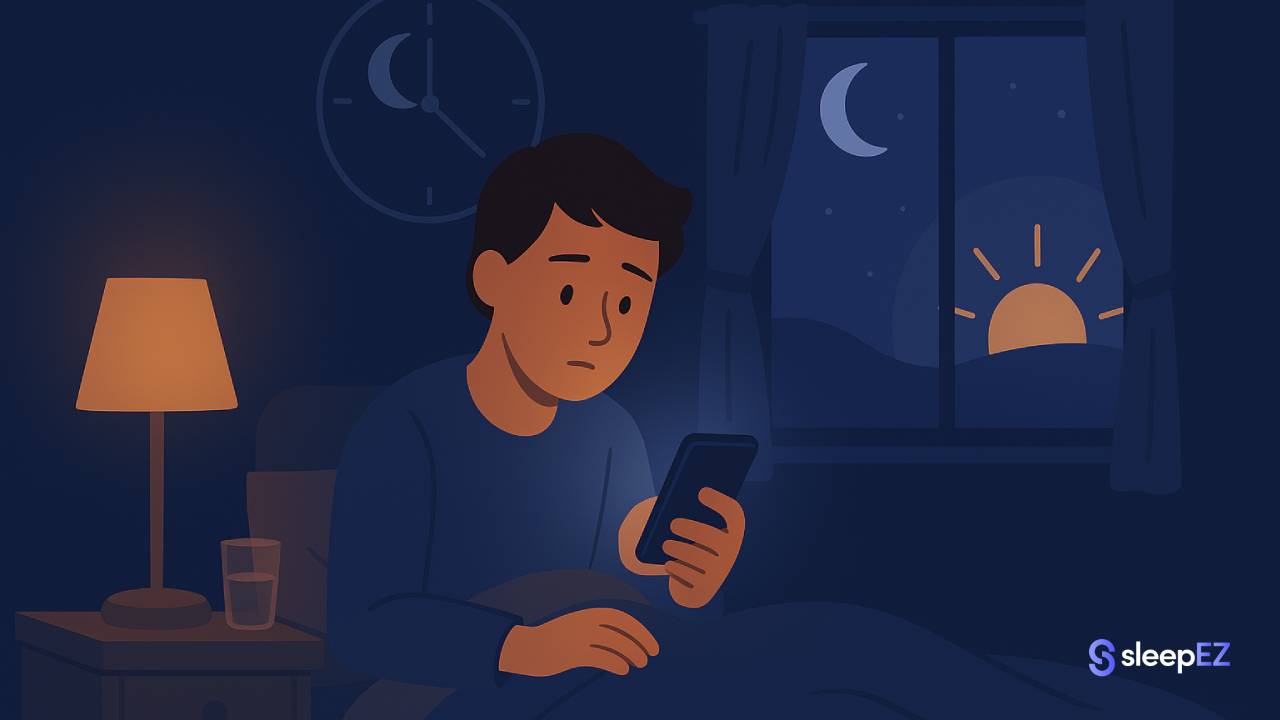Feeling like a zombie during the day and wide awake at 2 AM? Your sleep schedule is broken.
The good news: you can fix it. Learning how to fix your sleep schedule doesn't have to be complicated. This guide will show you how to reset your internal clock and get your sleep back on track.
Why Is a Consistent Sleep Schedule Important?
Your body runs on a circadian rhythm. This is your internal 24-hour clock that controls when you feel awake and when you feel tired.
When your sleep schedule is irregular, this rhythm gets confused. The result? You feel exhausted during the day, can't fall asleep at night, and your mood and energy levels suffer.
A consistent sleep schedule keeps your circadian rhythm stable. This means better focus, more energy, and improved overall health.
How to Fix Your Sleep Schedule: A Step-by-Step Guide
1. Set a Strict Wake-Up Time (This is the Anchor)
This is the most important step. Pick a wake-up time and stick to it every single day, including weekends.
Your wake-up time is more powerful than your bedtime for resetting your clock. Even if you go to bed late one night, get up at your set time. Your body will adjust.
2. Adjust Your Schedule Gradually
Don't try to shift your schedule by three hours overnight. Your body needs time to adapt.
Move your bedtime and wake time in 15-30 minute increments every few days. If you normally sleep from 2 AM to 10 AM, start by going to bed at 1:45 AM and waking at 9:45 AM. After a few days, shift again.
Small changes are easier to maintain.
3. Get Morning Sunlight Exposure
Light is the strongest signal to your brain that it's time to wake up. When sunlight hits your eyes in the morning, it tells your circadian rhythm to start the day.
Go outside within 30 minutes of waking up. Spend 10-15 minutes in natural light. If it's cloudy, that's fine. Outdoor light is still much brighter than indoor lighting.
Can't get outside? Sit by a window or use a bright light therapy lamp.
4. Create a Relaxing Bedtime Routine
Your brain needs a buffer zone between daytime activity and sleep. A bedtime routine signals that it's time to wind down.
Start your routine 30-60 minutes before bed. Good options include:
- Reading a book
- Taking a warm bath
- Listening to calming music
- Gentle stretching
- Meditation or deep breathing
Keep it simple and consistent.
5. Ban Screens (Blue Light) Before Bed
Blue light from phones, tablets, and computers suppresses melatonin. This is the hormone that makes you sleepy.
Stop using screens 1-2 hours before bed. If you must use a device, enable night mode or wear blue light blocking glasses.
The content matters too. Don't scroll through stressful news or work emails right before sleep.
6. Watch Your Caffeine, Alcohol, and Meal Timing
What you consume affects your sleep quality.
Caffeine: It stays in your system for 6-8 hours. Stop drinking coffee, tea, or energy drinks after early afternoon. For most people, that means no caffeine after 2 PM.
Alcohol: Many people think alcohol helps them sleep. It might make you drowsy, but it fragments your sleep later in the night. Limit alcohol, especially close to bedtime.
Meals: Large, heavy meals make it harder to fall asleep. Finish eating 2-3 hours before bed. If you're hungry, have a light snack like a banana or a handful of nuts.
7. Optimize Your Bedroom Environment
Your environment must support your new schedule. Make your bedroom cool, dark, and quiet.
Temperature: Keep your room between 60-67°F (15-19°C). Your body temperature naturally drops when you sleep, and a cool room helps this process.
Light: Even small amounts of light can disrupt sleep. This can be difficult if you have street noise or light pollution. Using tools to take control of your environment is key. A bluetooth sleep mask can block 100% of light while letting you listen to relaxing audio.
Sound: Noise from traffic, neighbors, or a snoring partner can wake you up repeatedly. Silicone earplugs or a sound machine for adults can mask disruptive noises.
This is all part of practicing good sleep hygiene.
Read also: Best earplugs For Sleeping Australia 2025
8. Be Smart About Naps
Naps can help you get through the day when you're resetting your schedule, but they can also make it harder to fall asleep at night.
If you must nap, follow these rules:
- Keep it short (20-30 minutes maximum)
- Nap before 3 PM
- Don't nap if you're having trouble falling asleep at night
9. Get Regular Exercise
Physical activity helps regulate your sleep-wake cycle. People who exercise regularly fall asleep faster and sleep more deeply.
Aim for at least 30 minutes of moderate exercise most days. Walking, jogging, swimming, or cycling all work.
Timing matters. Finish intense workouts at least 3-4 hours before bed. Exercise raises your body temperature and releases adrenaline, which can keep you awake.
10. Stay Consistent on Weekends
This is where most people fail. They stick to their schedule during the week, then sleep in on Saturday and Sunday.
Sleeping in by even two hours disrupts your circadian rhythm. This is called social jet lag, and it's why Monday mornings feel terrible.
Keep the same wake-up time every day. If you need extra rest on weekends, go to bed earlier instead of sleeping in.
Common Questions & Mistakes
Should You Pull an "All-Nighter" to Fix Your Sleep Schedule?
No. This is a common mistake that makes things worse.
When you stay up all night, you're not resetting your clock. You're just making yourself exhausted. You'll crash at the wrong time, often in the late afternoon or early evening, and then you'll be awake again at night.
All-nighters further disrupt your circadian rhythm. They also impair your judgment, mood, and physical health. Don't do it.
How Long Does It Take to Fix a Sleep Schedule?
Be patient. Most people need anywhere from a few days to two weeks to fully adjust.
The timeline depends on how far off your schedule is. If you're just an hour or two off, you might adjust in 3-5 days. If you're sleeping during the day and awake all night, expect two weeks or more.
Consistency is everything. The more strictly you follow your new schedule, the faster you'll adjust.
What Is the "3-2-1" Sleep Rule?
This is a simple memory trick to improve your sleep:
- 3 hours before bed: Stop eating and drinking alcohol
- 2 hours before bed: Finish any work or stressful activities
- 1 hour before bed: Turn off all screens
It's not a magic solution, but it's a helpful framework for building better habits.
Start Tonight
Fixing your sleep schedule takes effort, but it's simpler than most people think.
The most important thing? Your wake-up time. Set it, and stick to it no matter what. Everything else builds from there.
Start with just one change tonight. Pick your wake-up time, set your alarm, and commit to getting up at that time tomorrow. Once that becomes automatic, add the next step.
Your body wants to sleep well. Give it the consistency it needs, and it will respond.




Leave a comment
This site is protected by hCaptcha and the hCaptcha Privacy Policy and Terms of Service apply.